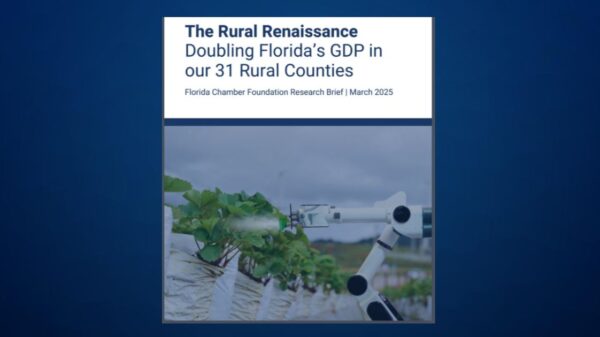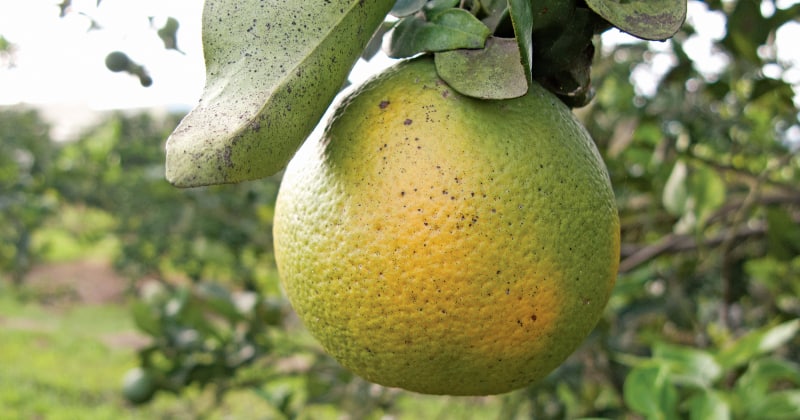This week, Florida’s agriculture commissioner threw his support behind a bill on Capitol Hill “to ensure the U.S. Department of Agriculture (USDA) can provide needed relief to agriculture producers devastated by Hurricanes Ian and Nicole.”
At the end of January, U.S. Sen. Rick Scott, R-Fla., and U.S. Rep. Scott Franklin, R-Fla., brought out the “Block Grant Assistance Act,” with U.S. Sen. Marco Rubio, R-Fla., and U.S. Rep. Debbie Wasserman Schultz, D-Fla., co-sponsoring it.
“This bill will provide the Agriculture Secretary needed authority to provide block grants to the state of Florida to assist producers affected by the two hurricanes,” Franklin’s office noted.
“The Florida citrus industry is synonymous with the Sunshine State and the backbone of many of our rural communities,” said Franklin,. “Between an extreme hurricane season and ongoing issues such as citrus greening, our resilient citrus growers continue to navigate significant challenges. It’s critical that we provide immediate support so Americans can continue to enjoy the staples our domestic citrus industry provides.”
“The loss and devastation caused by Hurricanes Ian and Nicole has forever changed communities across our state and the lives of so many Florida families and businesses,” said Scott. “Folks in the Sunshine State are still picking up the pieces, and I’ve continued to work closely with USDA, FEMA and SBA to ensure they remain a top priority during this time of recovery. As we work to get the citrus and agriculture community back on their feet, I won’t stop fighting to make sure that the federal government keeps showing up. Our Block Grant Assistance Act is a step in the right direction to ensure Florida’s agriculture industry gets the help they need.”
“A Florida citrus comeback cannot be waylaid by hurricanes and greening, so I’m proud to help ensure that our U.S. Department of Agriculture has the back of growers and processors as they rebuild, replant and revive the harvests that fuel America’s breakfast table,” said Wasserman Schultz.
Since the end of January, two dozen other House members, all from Florida, lined up behind the bill which also has the support of some leaders of Florida’s agriculture community.
“Thanks to Rep. Franklin and Sen. Scott for fighting for Florida’s citrus growers,” said Matt Joyner, the president of Florida Citrus Mutual. “Just as the industry was on the verge of a comeback, Hurricanes Ian and Nicole dealt us another blow. The Block Grant Assistance Act will enable Florida’s citrus growers to rebuild and replant so we can continue to harvest and produce America’s favorite breakfast juice.”
“The statewide toll of Hurricanes Ian and Nicole on the Florida agricultural industry was devastating,” said Mike Joyner, the president of the Florida Fruit and Vegetable Association. “The supplemental disaster relief funding in the omnibus bill secured critically needed support for the industry’s recovery efforts. However, it failed to recognize the full impact and reach those who needed it most. The introduction of this bill will provide flexibility to the U.S. Secretary of Agriculture to better address grower needs. We are grateful to Congressman Franklin and Congresswoman Wasserman Schultz, who heard the industry’s concerns and are championing this needed change.”
This week, Florida Agriculture Commissioner Wilton Simpson said he backed the proposal.
“Florida’s agriculture community suffered more than a billion dollars in damage this past hurricane season, and the impacts are still being felt by producers today. I applaud Representative Scott Franklin, Senators Rick Scott and Marco Rubio, and the entire Florida congressional delegation for prioritizing this bill to give the support and relief needed for the industry to recover from the devastating storms and allow Florida to continue to provide the safest, most abundant, and affordable food supply in the nation – and the world,” Simpson said.
Franklin’s bill was sent to the U.S. House Agriculture Committee which assigned it to its Subcommittee on General Farm Commodities, Risk Management, and Credit. Scott’s bill was sent to the U.S. Senate Agriculture, Nutrition, and Forestry Committee.
Jackery Explorer 1000 v2 Portable Power Station,1070Wh LiFeP...
$448.99 (as of May 20, 2025 16:03 GMT -04:00 - More infoProduct prices and availability are accurate as of the date/time indicated and are subject to change. Any price and availability information displayed on [relevant Amazon Site(s), as applicable] at the time of purchase will apply to the purchase of this product.)EnginStar Portable Power Station 300W 296Wh Battery Bank wit...
$129.98 (as of May 20, 2025 16:03 GMT -04:00 - More infoProduct prices and availability are accurate as of the date/time indicated and are subject to change. Any price and availability information displayed on [relevant Amazon Site(s), as applicable] at the time of purchase will apply to the purchase of this product.)Anker SOLIX C300 DC Power Bank Station, Outdoor 288Wh Portab...
$189.99 (as of May 20, 2025 16:03 GMT -04:00 - More infoProduct prices and availability are accurate as of the date/time indicated and are subject to change. Any price and availability information displayed on [relevant Amazon Site(s), as applicable] at the time of purchase will apply to the purchase of this product.)EF ECOFLOW Portable Power Station DELTA 2 Max, 2400W LFP Sol...
$1,099.00 (as of May 20, 2025 16:03 GMT -04:00 - More infoProduct prices and availability are accurate as of the date/time indicated and are subject to change. Any price and availability information displayed on [relevant Amazon Site(s), as applicable] at the time of purchase will apply to the purchase of this product.)Generac 6485 Scheduled Maintenance Kit for 20kW and 22kW Sta...
$26.99 (as of May 20, 2025 16:03 GMT -04:00 - More infoProduct prices and availability are accurate as of the date/time indicated and are subject to change. Any price and availability information displayed on [relevant Amazon Site(s), as applicable] at the time of purchase will apply to the purchase of this product.)






















